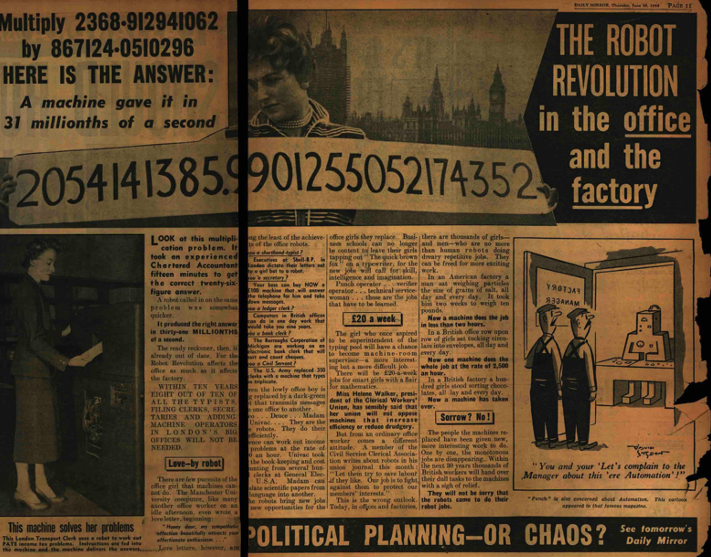
| Home > LEO Computers > LEOPEDIA > Historical Newspapers > The Robot Revolution ... ffice and the Factory |
The Robot Revolution in the Office and the Factory
| Home > LEO Computers > LEOPEDIA > Historical Newspapers > The Robot Revolution ... ffice and the Factory |
|
Article in the Daily Mirror on 30th June 1955 on automation, in which LEO I is mentioned, along with Deuce, Madam (Manchester Baby) and the American computer Univac. Date : 30th June 1955Transcript : THE ROBOT REVOLUTION in the office and the factory Look at this multiplication problem. It took an experienced Chartered Accountant fifteen minutes to get the correct twenty-six-figure answer. A robot called in on the same problem was somewhat quicker. It produced the right answer in thirty-one millionths of a second. The ready reckoner, then, is already out of date. For the robot revolution affects the office as much as it affects the factory. WITHIN TEN YEARS EIGHT OUT OF TEN OF ALL THE TYPISTS, FILING CLERKS, SECRETARIES AND ADDING-MACHINE OPERATORS IN LONDON'S BIG OFFICES WILL NOT BE NEEDED. Love - by robot There are few pursuits of the office girl that machines cannot do. The Manchester University computor, like many another office worker on an idle afternoon, even wrote a love letter, beginning: “Honey dear, my sympathetic affection beautifully attracts your affectionate enthusiasm...” Love letters, however, are among the least of the achievements of the office robots. Are you a shorthand typist? Executives at Shell B.P. London dictate their letters not to a girl but to a robot. Are you a secretary? Your boss could buy NOW a £100 machine that will answer the telephone for him and take down messages. Are you a ledger clerk? Computors in British offices can do in one day work that would take you nine years. Are you a bank clerk? The Burroughs Corporation of Michigan are working on an electronic bank clerk that will sort and count cheques. The U.S. Army replaced 350 clerks with a machine that types in triplicate. Even the lowly office boy is being replaced by a dark-green robot that transmits messages from one office to another. Leo... Deuce Madam... Univac... They are the office robots. They do their job efficiently. Deuce can work out income tax problems at the rate of 3,000 an hour. Univac took over the book keeping and cost accounting from several hundred clerks at General Electric, U.S.A. Madam can translate scientific papers from one language into another. The robots bring new jobs and new opportunities for the office girls they replace. Business schools can no longer be content to leave their girls tapping out “The quick brown fox” on a typewriter, for the new jobs will call for skill, intelligence and imagination. Punch operator... verifier operator... technical service woman...those are the jobs that have to be learned. £20 a week The girl who once aspired to be superintendent of the typing pool will have a chance to become machine-room supervisor - a more interesting but more difficult job. There will be £20-a-week jobs for smart girls with a flair for mathematics. Miss Helene Walker, president of the Clerical Workers Union, has sensibly said that her union will not oppose machines the increase efficiency or reduce drudgery. But from an ordinary office worker comes a different attitude. A member of the Civil Service Clerical Association writes about robots in his union journal this month: “Let them try to save labour if they like. Our job is to fight against them to protect our members’ interests.” This is the wrong outlook. Today, in offices and factories there are thousands of girls - and men - who are no more than human robots doing dreary competitive jobs. They can be freed for more exciting work. In an American factory a man sat weighing particles the size of grains of salt, all day and every day. It took him two weeks to weigh ten pounds. Now a machine does the job in less than two hours. In a British factory one hundred girls stood sorting chocolates, all day and every day. Now a machine has taken over. Sorrow? No! The people the machines replaced have been given new, more interesting work to do. One by one, the monotonous jobs are disappearing. Within the next thirty years thousands of British workers will hand over their dull tasks to the machines with a sigh of relief. They will not be sorry that the robots came to do their robot jobs. This exhibit has a reference ID of CH64169. Please quote this reference ID in any communication with the Centre for Computing History. |
|










